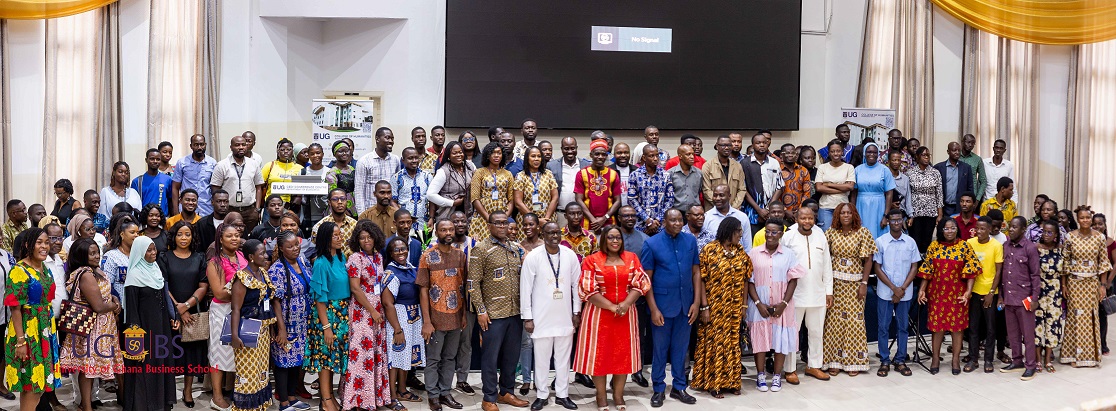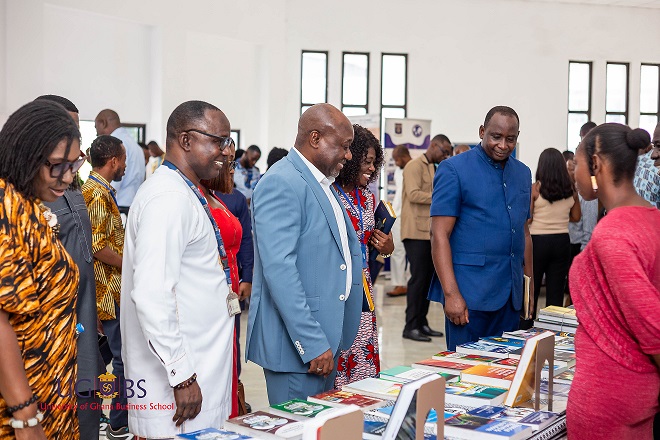
UGBS Participates in the 2025 College of Humanities Celebration of the Day of Scientific Renaissance of Africa and Scholarly Exhibition
The University of Ghana Business School (UGBS) joined other units of the College of Humanities to commemorate the 2025 edition of the Day of Scientific Renaissance of Africa (DRA), held on 20th June 2025, at the Cedi Conference Centre. The event, themed “Ghana’s Climate Innovation Landscape: Unlocking Potential with Science and Sustainability”, featured a scholarly exhibition and a keynote lecture aimed at promoting research-driven climate action through interdisciplinary collaboration.
The celebration was chaired by the Provost of the College of Humanities, Prof. Joseph Awetori Yaro, who welcomed participants and highlighted the significance of the occasion. In his remarks, he mentioned that the Day of Scientific Renaissance of Africa was initiated by the African Union in 1987 to be observed annually in June to recognise and celebrate the contributions of science and technology to African development. He underlined that this year’s theme reflects the urgent need for climate innovation and scientific progress in response to increasing environmental challenges. “We have gathered to showcase our research contributions, innovations, and societal impact in the development of science and technology in Africa,” Prof. Yaro said. He explained the importance of integrating the humanities and social sciences into scientific research to foster the acceptance and application of climate technologies. “The humanities provide the conceptual and contextual lenses for understanding the social, cultural, political, and technological responses to climate change,” he added.
Delivering a solidarity message on behalf of the University Management, the Pro Vice-Chancellor for Academic and Student Affairs, Prof. Gordon Akanzuwine Awandare, reiterated the university’s commitment to tackling climate change through interdisciplinary research and capacity building. He noted that the University of Ghana, since 2022, has marked the Day of Scientific Renaissance, with this year’s celebration serving as a prelude to the main university-wide event scheduled for the end of June. Prof. Awandare revealed that the University of Ghana had secured a significant partnership with the Mastercard Foundation, under which $24 million will be invested over the next eight years to develop capacity and support climate-related research. The initiative will fund advanced academic training, particularly targeting youth, women, and persons with disabilities. He urged all academic units to contribute innovative research ideas addressing climate challenges, stating that 70% of the project’s participants will come from marginalised groups.

Taking her turn as the keynote speaker, Ms. Roselyn Fosuah Adjei, Director of Climate Change at the Forestry Commission, Ghana and a PhD Candidate at UG, delivered a presentation titled “Ghana’s Climate Innovation Landscape: Unlocking Potential with Science and Sustainability.” Her address offered an in-depth exploration of Ghana’s efforts to address climate change through a fusion of science, policy, and local ingenuity.
Ms. Adjei identified major sectoral causes of climate change in Ghana, including the burning of fossil fuels, deforestation, poor waste management, and the proliferation of unsustainable buildings. She emphasised the need for a science-led transition to a low-carbon, climate-resilient economy, calling for greater investment in clean energy, data-driven policymaking, and local technological adaptation. She referenced several national policy frameworks supporting Ghana’s climate innovation plans, including: The Energy Policy (2010) and the National Energy Transition Framework (2022–2070), which outline Ghana’s decarbonisation roadmap using renewable energy, the Forest and Wildlife Policy (2012) and Ghana REDD+ Strategy (2016), as well as the Ghana National Climate Change Policy (2013), which guide national climate action.
In her discussion of “Humanities for Sustainability,” she posed critical questions about the scalability of climate innovations and Ghana’s capacity to adapt technologies to local conditions. She stressed that sustainability efforts must consider the realities of rural areas, the availability of local raw materials, and the strength of domestic industry. Ms. Adjei also presented case studies of ongoing innovations in Ghana’s climate space, including Restoration Initiatives, Clean Mobility, and Circular Waste Solutions. She concluded by highlighting barriers such as limited financing, fragmented regulations, and technical capacity gaps, and called for greater cross-sectoral collaboration, improved policy coherence, and inclusive innovation ecosystems to help Ghana meet its Nationally Determined Contributions under the Paris Agreement.
The event also featured an exhibition of scholarly works from the various departments within the College of Humanities. UGBS exhibited its faculty contributions to climate-focused research and policy engagement in areas such as green finance, sustainability marketing, energy economics, and climate risk management. The 2025 celebration of the Day of Scientific Renaissance of Africa brought together academia, policymakers, researchers, students, and development partners to discuss and reflect on the critical role of science, sustainability, and the humanities in Ghana’s climate innovation agenda.